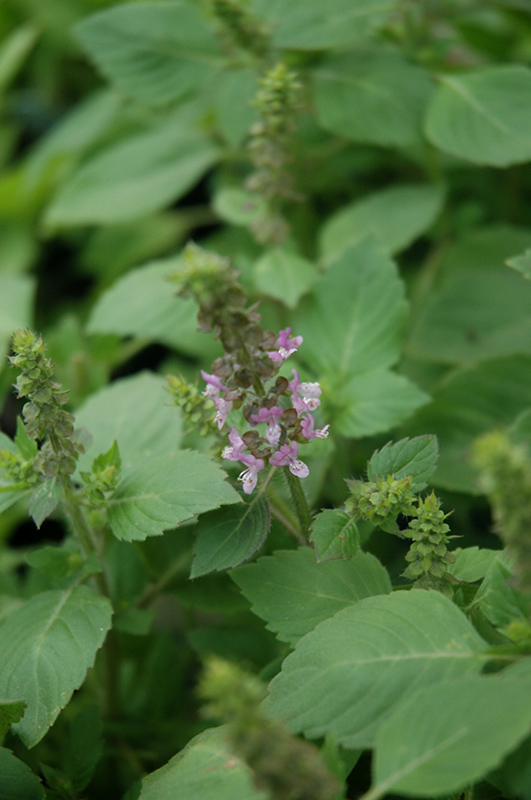Height: 3 feet
Spacing: 18 inches
Sunlight:
![]()
Hardiness Zone: (annual)
Other Names: syn. Ocimum sanctum, Tulasi, Thulasi
Description:
An aromatic, short lived perennial that is grown as a medicinal in eastern cultures; produces small purplish pink and white flowers in summer; pinch flower stems to promote leaf growth; great for mixed containers, herb gardens
Edible Qualities
Holy Basil is an annual herb that is typically grown for its edible qualities, although it does have ornamental merits as well. The fragrant oval green leaves are usually harvested from early summer to early fall. The leaves have a pleasant taste and a distinctive fragrance.
The leaves are most often used in the following ways:
- Fresh Eating
- Cooking
- Seasoning
Planting & Growing
Holy Basil will grow to be about 3 feet tall at maturity, with a spread of 24 inches. When grown in masses or used as a bedding plant, individual plants should be spaced approximately 18 inches apart. Although it's not a true annual, this fast-growing plant can be expected to behave as an annual in our climate if left outdoors over the winter, usually needing replacement the following year. As such, gardeners should take into consideration that it will perform differently than it would in its native habitat.
This plant can be integrated into a landscape or flower garden by creative gardeners, but is usually grown in a designated herb garden. It should only be grown in full sunlight. It prefers to grow in average to moist conditions, and shouldn't be allowed to dry out. It is not particular as to soil type or pH. It is somewhat tolerant of urban pollution. This species is not originally from North America.
Holy Basil is a good choice for the edible garden, but it is also well-suited for use in outdoor pots and containers. With its upright habit of growth, it is best suited for use as a 'thriller' in the 'spiller-thriller-filler' container combination; plant it near the center of the pot, surrounded by smaller plants and those that spill over the edges. It is even sizeable enough that it can be grown alone in a suitable container. Note that when growing plants in outdoor containers and baskets, they may require more frequent waterings than they would in the yard or garden.



